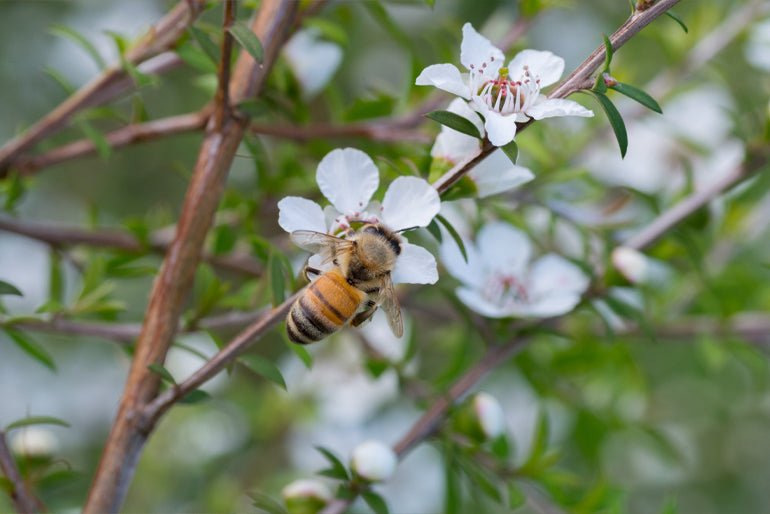
Manuka Honey for Dogs: A Short Go-to Guide

My name is Gavin Gear. As the Founder and owner of ManukaGuard, I can attest to the benefits of giving my dog Bruno manuka honey. I give him our Medical Grade Manuka Honey MGO 400, every morning, and he loves it. More importantly, it helps support his digestion and immunity by providing him oligosaccharides, a prebiotic that supports a healthy gut microbiome.
Manuka honey stands out in natural health for its distinct antibacterial qualities, which have garnered acclaim in human and veterinary healing practices. This honey's broad-spectrum antibacterial action is particularly effective against Staphylococcus aureus, a zoonotic bacterium, making it an excellent antimicrobial choice in clinical settings concerned with high animal-to-human zoonotic transmission risks.
This article covers the benefits of manuka honey for dogs, our loving four-legged friends who deserve only the best. It also covers some frequently asked questions that people are also asking me. I hope you enjoy it.
The Healing Benefits for Dog Wounds
Among its numerous benefits, Manuka honey is particularly renowned for its wound-healing properties. When applied to dogs' cuts, abrasions, and skin ailments, it promotes a faster and more efficient healing process.
Soothing Sore Throats in Dogs
Manuka honey also offers relief for dogs with coughs and sore throats. It can be administered by mixing a teaspoon into their food or water, providing throat relief and enhancing their overall health.
Digestive Health Improvement
The dual action of Manuka honey as a probiotic and prebiotic agent is beneficial for a dog's digestive system. It can alleviate digestive discomforts like diarrhea and constipation. For dogs with frequent digestive upsets, it is recommended to pair Manuka honey with a high-quality probiotic supplement. My 74 lb Husky, Bruno, takes his honey straight, and we noticed a significant improvement in his attitude and playfulness, which calmed him down. His days of diarrhea were over.

Immune System Enhancement
In addition to its digestive benefits, Manuka honey can boost a dog's immune system. Its unique antibacterial compounds and antioxidant properties contribute to a more robust immune defense and improved general well-being. Incorporating a daily teaspoon of Manuka honey into your dog's diet can be an excellent way to enhance their immune health.
Extending the Therapeutic Reach of Manuka Honey in Veterinary Medicine
Dental Health Contributions
Often overlooked, a dog's dental health is of significant importance. The antibacterial nature of Manuka honey can be beneficial for maintaining oral health. Used with discretion, it can help control the formation of dental plaque and suppress the growth of harmful oral bacteria. A side note on the Founder: Gavin has gone from teeth cleaning every six months to teeth cleaning every two years—the result of daily medical-grade manuka consumption and no plaque. Bruno no longer needs those expensive teeth-cleaning chews.
Managing Skin Conditions and Allergies
For dogs experiencing skin sensitivities or allergies, Manuka honey can act as a soothing agent. Its anti-inflammatory qualities help relieve irritation from various allergic reactions and hot spots, and it is beneficial during peak allergy seasons, providing a gentle, natural remedy that complements prescribed medications. We stop Bruno licking hot spots with manuka honey, and a point to note is covering the honey so he cannot lick it off is challenging. A good ten minutes is all we get before the bandage is chewed off, but it's enough. Two or three such treatments and he stops the hot spot licking.
Enhancing Energy and Vitality
Manuka honey can be an excellent energy source for aging dogs or those recuperating from illness. Its natural sugars provide a rapid energy boost, beneficial for dogs that need additional support to maintain their activity levels.
Addressing Your Concerns: FAQs About Manuka Honey for Dogs
Is Manuka honey safe for my dog?
Manuka honey is safe for most dogs when used in moderation. Nonetheless, it is essential to consult a veterinarian before introducing Manuka honey to your dog's diet, particularly if your dog has pre-existing health conditions like diabetes, which could be negatively affected by the sugars in honey.
What Manuka honey strength is ideal for dogs?
The strength of Manuka honey is often denoted by its MGO or Unique Manuka Factor (UMF) rating, reflecting its active compounds' concentration. Veterinarians generally suggest medical-grade Manuka honey with an MGO 200 or UMF of 10+ for therapeutic use in dogs to ensure adequate antibacterial efficacy that's also safe for the animal.
How much Manuka honey can I give my dog?
The appropriate amount of Manuka honey for your dog depends on their size and the issue; however, a teaspoon for a large dog, half that for a small dog, and learn from their behavior and change the amount as needed. For topical use, apply enough to cover the area. For internal use, such as aiding digestion, a quarter teaspoon for small dogs or up to one teaspoon for larger breeds once daily is recommended. As always, seek veterinary advice to determine the correct dosage for your pet.
Why do veterinarians use Manuka honey?
Veterinarians rely on Manuka honey for its potent antibacterial properties, particularly its effectiveness against bacteria resistant to antibiotics. It's beneficial in managing wound infections, promoting healing, and mitigating inflammation. The honey can also intensify the effects of antibiotics, making it a valuable component in treating drug-resistant infections.
Integration of Manuka Honey in Holistic Veterinary Practices
As veterinary medicine evolves, there is an increasing emphasis on integrative approaches that combine traditional and modern therapies. Holistic veterinarians frequently recommend Manuka honey as part of a comprehensive health plan that may include conventional medicine, dietary support, and alternative treatments.
Ongoing Research and Emerging Uses
The field of veterinary science continues to explore the potential roles of Manuka honey, such as its influence on gut health and its potential as a solution for antibiotic resistance. Current research is examining how Manuka honey might improve nutrient absorption and fortify immune function by positively affecting the gut microbiome.
Precautions and Quality Assurance
While Manuka honey's benefits are extensive, it is unsuitable for certain dogs, including puppies under one year of age, due to botulism risk. Additionally, dogs with conditions that could be exacerbated by sugar intake, like diabetes or obesity, should be closely monitored if Manuka honey is part of their regimen.
Selecting High-Quality Manuka Honey
It is essential only to use medical-grade manuka honey that contains MGO (Methylglyoxal) properties, such as our Medical Grade Manuka Honey MGO 400 - All In One. This type of honey possesses a unique non-peroxide antibacterial activity that makes it superior to regular honey. Medical-grade manuka honey is a specialized type of honey with a higher antibacterial activity, making it a better option for therapeutic purposes.
Collaborating with Veterinary Experts
Engaging with a veterinary professional is crucial when considering Manuka honey for therapeutic use. Veterinarians can guide the correct dosing and monitor your dog's reaction to the treatment, making necessary adjustments to optimize health outcomes.
Conclusion
Manuka honey exemplifies how traditional remedies are rediscovered and incorporated into contemporary veterinary care. Its versatility and favorable safety profile make it an appealing option for addressing various canine health concerns.
As scientific research progresses, the future may unveil even more applications for Manuka honey in veterinary medicine, presenting pet owners and veterinarians with an effective tool for promoting animal health.
Link: https://www.dogsnaturallymagazine.com/mānuka-honey-for-your-dog/






